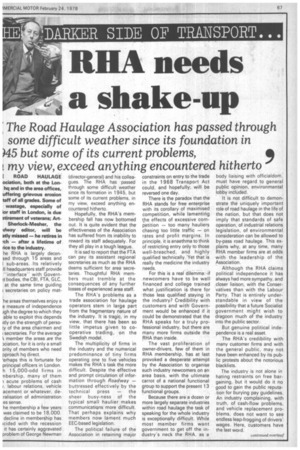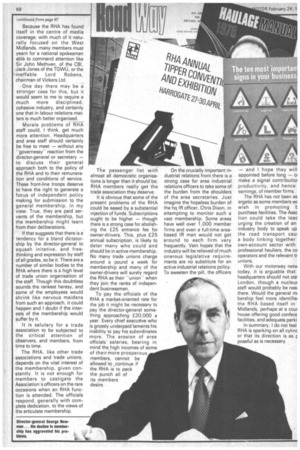RHA needs a shake-up
Page 69

Page 70

If you've noticed an error in this article please click here to report it so we can fix it.
ociation, both at the Lonhq and in the area offices, uffering grievous erosion taff of all grades. Some of wastage, especially of ior staff in London, is due atirement of veterans; ArtSherlock-Mesher, the ,dway editor, will be atly missed — he retires in rch — after a lifetime of rice to the industry.
he RHA is largely decensed through 15 areas and sub-areas. Its relatively iII headquarters staff provide "interfacewith Governit bodies, the CBI, FTA, GLC, at the same time guiding secretaries on policy mat
'he areas themselves enjoy a e measure of independence igh the degree to which they able to exploit this depends itly on the strength of persoty of the area chairmen and isecretaries. For the average s, member the areas are the )ciation, for it is only a small ority of members who need pproach hq direct.
'erhaps this is fortunate for principal officers in London. h 15,000-odd firms in nbership, many of them
acute problems of cash r, labour relations, vehicle acement or whatever, deralisation of administration es sense.
he membership a few years was claimed to be 18,000. decline in membership has icided with the recession it has certainly aggravated problem of George Newman ROAD HAULAGE constraints on entry to the trade (director-general) and his colleagues. The RHA has passed through some difficult weather since its formation in 1945, but some of its current problems, in my view, exceed anything encountered hitherto.
Hopefully, the RHA's membership fall has now bottomed out. It is quite evident that the effectiveness of the Association has suffered from its inability to reward its staff adequately. For they all play in a tough league.
It is sad to report that the FTA can pay its assistant regional secretaries as much as the RHA deems sufficient for area secretaries. Thoughtful RHA members must tremble at the consequences of any further losses of experienced area staff.
The RHA's problems as a trade association for haulage operators stem in large part from the fragmentary nature of the industry. It is tragic, in my view, that there has been so little impetus given to cooperative trading, on the Swedish model.
The multiplicity of firms in the industry and the numerical predominance of tiny firms operating one to five vehicles makes the RHA's task the more difficult. Despite the effective and prompt circulation of information through Roadway — buttressed effectively by the technical press — the sheer busy-ness of the typical small haulier makes communications more difficult. That perhaps explains why members now lament much EEC-based legislation.
The political failure of the Association in retaining major in the 1968 Transport Act could, and hopefully, will be reversed one day.
There is the paradox that the RHA stands for free enterprise with its corollary of maximised competition, while lamenting the effects of excessive competition — too many hauliers chasing too little traffic — on rates and profit margins. In principle, it is anaethrna to think of restricting entry only to those well-breached, and highly qualified technically. Yet that is really the medicine the industry needs.
For this is a real dilemma:,if newcomers have to be well financed and college trained what justification is there for those less qualified staying in the industry? Credibility with customers and with Government would be enhanced if it could be demonstrated that the RHA speaks for a truly professional industry, but there are many more firms outside the RHA than inside.
The vast proliferation of owner-drivers, few of them in RHA membership, has at last provoked a desperate attempt by the Association to organise such industry newcomers on an area basis, with the ultimate carrot of a national functional group to support the present 13 functional groups.
Because there are a dozen or more largely separate industries within road haulage the task of speaking for the whole industry is exceptionally difficult. While most member firms want government to get off the industry's neck the RHA, as a body liaising with officialdom, must have regard to general public opinion, environmental lobby included.
It is not difficult to demonstrate the uniquely important role of road haulage in the life of the nation, but that does not imply that standards of safe operation, of industrial relations legislation, of environmental consideration can be allowed to by-pass road haulage. This explains why, at any time, many RHA member firms are at odds with the leadership of the Association.
Although the RHA claims political independence it has always had more sympathy, and closer liaison, with the Conservatives than with the Labour Party. That is entirely understandable in view of the possibility that a future Socialist government might wish to dragoon much of the industry into the public sector.
But genuine political independence is a real asset.
The RHA's credibility with many customer firms and with the general public, may not have been enhanced by its public protests about the notorious blacklists.
The industry is not alone in hating restraints on free bargaining, but it would do it no good to gain the public reputation for burying pay guidelines. An industry complaining, with truth, of cash-flow problems, and vehicle replacement problems, does not want to see endless leap-frogging of drivers' wages. Here, customers have the last woid. Because the RHA has found itself in the centre of media coverage, with much of it naturally focused on the West Midlands, many members must yearn for a national spokesman able to command attention like Sir John Methven, of the CBI, Jack Jones of the TGWU, or the ineffable Lord Robens, chairman of Vickers Ltd.
One day there may be stronger case for this, but it would seem to me to require a much more disciplined, cohesive industry, and certainly one that in labour relations matters is much better organised.
Morale problems of RHA staff could, I think, get much more attention. Headquarters and area staff should certainly be free to meet — without any "governessyreaction from the director-general or secretary — to discuss their general approach both to the policy of the RHA and to their remuneration and conditions of service. These front-line troops deserve to have the right to generate a focus of independent policy making for submission to the general membership, in my view. True, they are paid servants of the membership, but the membership might learn from their deliberations.
If that suggests that there is a tendency for a bland dictatorship by the director-general to squash initative, and freethinking and expression by staff of all grades, so be it. There are a number of similar bodies to the RHA where there is a high level of trade union organisation of the staff. Though this doubtless sounds the rankest heresy, and some of the employees would shrink like nervous maidens from such an approach, it could happen and I doubt if the interests of the membership would suffer by it,
It is salutary for a trade association to be subjected to the critical attention of observers, and members, from time to time.
The RHA, like other trade associations and trade unions, depends on the vital interest of the membership, given constantly. It is not enough for members to castigate the Association's officers on the rare occasions when an RHA function is attended. The officials respond, generally with complete dedication, to the views of the articulate membership.
The passenger list with almost all democratic organisations is longer than it should be; RHA members really get the trade association they deserve.
It is obvious that some of the present problems of the RHA could be eased by a substantial injection of funds. Subscriptions ought to be higher — though there is a strong case for abolishing the £25 entrance fee for owner-drivers. This, plus £25 annual subscription, is likely to deter many who could and should be in active membership. No many trade unions charge around a pound a week for membership and many of the owner-drivers will surely regard the RHA as their -unionwhen they join the ranks of independent businessmen.
To pay the officials of the RHA a market-oriented rate for the job it might be necessary to pay the director-general something approaching £20,000 a year. Every chief executive who is grossly underpaid laments his inability to pay his subordinates more. The erosion of area officials' salaries, bearing in mind the high incomes of some of their more prosperous members, cannot be allowed to _continue if the PHA is to pack the punch all of its members desire. On the crucially important industrial relations front there is a strong case for area industrial relations officers to take some of the burden from the shoulders of the area secretaries. Just imagine the hopeless burden of the hq IR officer, Chris Dixon, in attempting to monitor such a vast membership. Some areas have well over 1,000 member firms and even a full-time areabased IR man would not get around to each firm very frequently. Vain hopes that the industry will be relieved of much onerous legislative requirements are no substitute for an active industrial relations policy. To sweeten the pill, the officers
— and r hope they will appointed before long — co make a signal contributioi productivity, and hence earnings, of member firms.
The RHA has not been as ergetic as some members w( wish in promoting purchase facilities. The Assc tion could take the leac urging the creation of an industry body to speak up the road transport caw a body linking together own-account sector with professional hauliers, the co operators and the relevant tr unions.
With our motorway netys, today, it is arguable that headquarters should not sta London, though a nucleut staff would probably be neel there. Would the general mi bership feel more identifiel the RHA based itself in Midlands, perhaps at a cour house offering good confere facilities, and adequate parki In summary, I do not feel RHA is sparking on all cylinc or that its direction is as poseful as is necessary.




















































































































